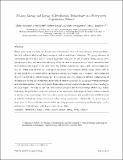Primary energy and exergy of desalination technologies in a power-water cogeneration scheme
Author(s)
Altmann, Thomas; Robert, Justin; Bouma, Andrew Thomas; Swaminathan, Jaichander; Lienhard, John H
DownloadAccepted version (1.119Mb)
Terms of use
Metadata
Show full item recordAbstract
The primary energy consumption of a spectrum of desalination systems is assessed using operating information and technical bids for real plants configured with coproduction of electricity. The energy efficiency of desalination plants is often rated on a stand-alone basis using metrics such as specific energy consumption, gained output ratio, and second law efficiency, which can lead to inconsistent conclusions because the heat and electrical work inputs to the plant have very different exergies and costs, which must be taken into account. When both the heat and work inputs are drawn from a common primary energy source, such as the fuel provided to electricity-water coproduction systems, these inputs can be compared and combined if they are traced back to primary energy use. In the present study, we compare 48 different configurations of electricity production and desalination on the basis of primary energy use, including cases with pretreatment and hybridized systems, using performance figures from real and quoted desalination systems operating in the GCC region. The results show that, while reverse osmosis is still the most energy efficient desalination technology, the gap between work and thermally driven desalination technologies is reduced when considered on the basis of primary energy. The results also show that pretreatment with nanofiltration or hybridization of multiple desalination systems can help to reduce energy requirements. Additionally, the specific type of power plant in the coproduction scheme and its operating parameters can have a significant impact on the performance of desalination technologies relative to one other. Keywords: Desalination; Exergy; Thermodynamics; Primary energy; Energy efficiency
Date issued
2019-06Department
Massachusetts Institute of Technology. Department of Mechanical Engineering; Rohsenow Kendall Heat Transfer Laboratory (Massachusetts Institute of Technology)Journal
Applied Energy
Publisher
Elsevier BV
Citation
Altmann, Thomas et al. "Primary energy and exergy of desalination technologies in a power-water cogeneration scheme." Applied Energy 252 (October 2019): 113319 © 2019 Elsevier Ltd
Version: Author's final manuscript
ISSN
0306-2619